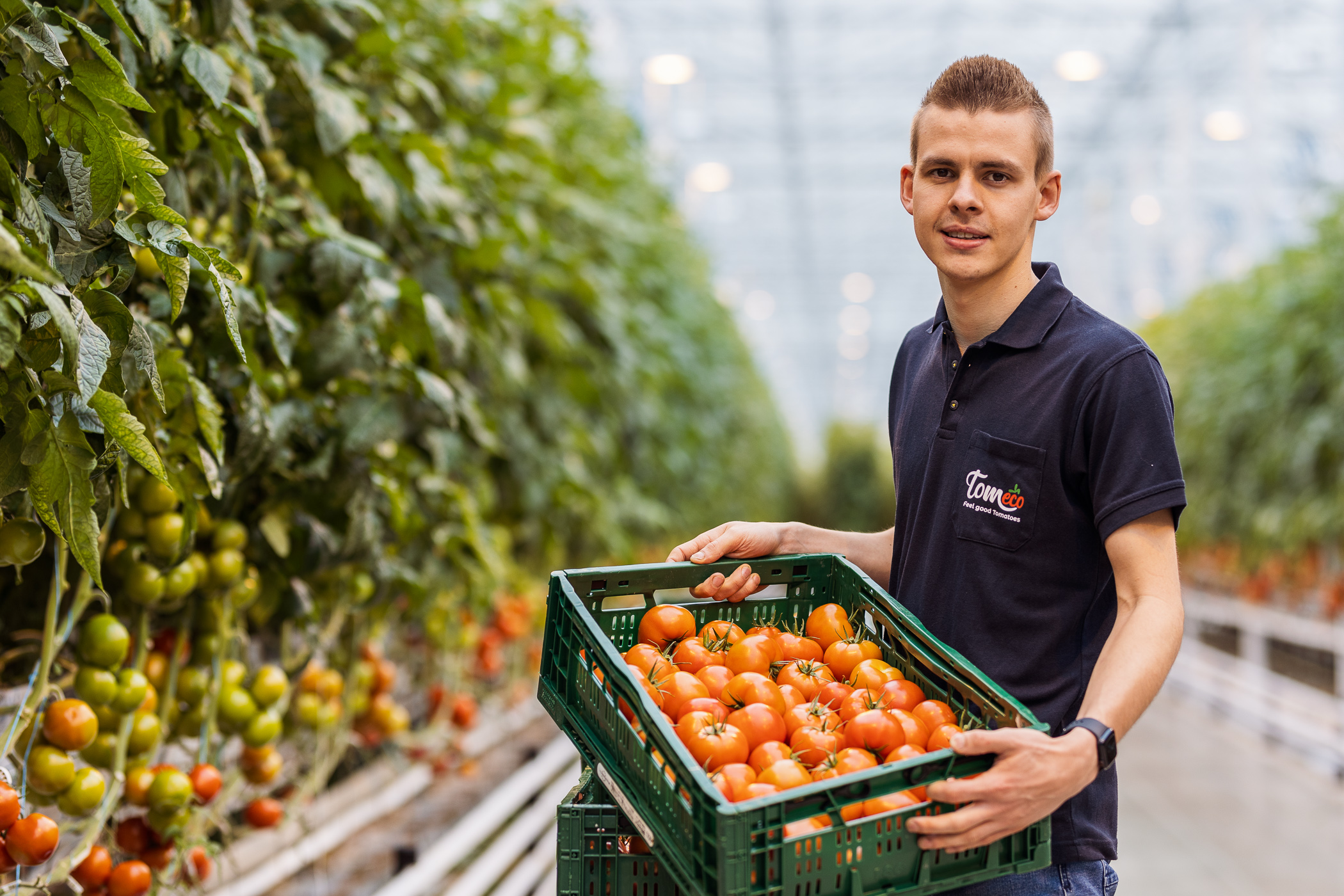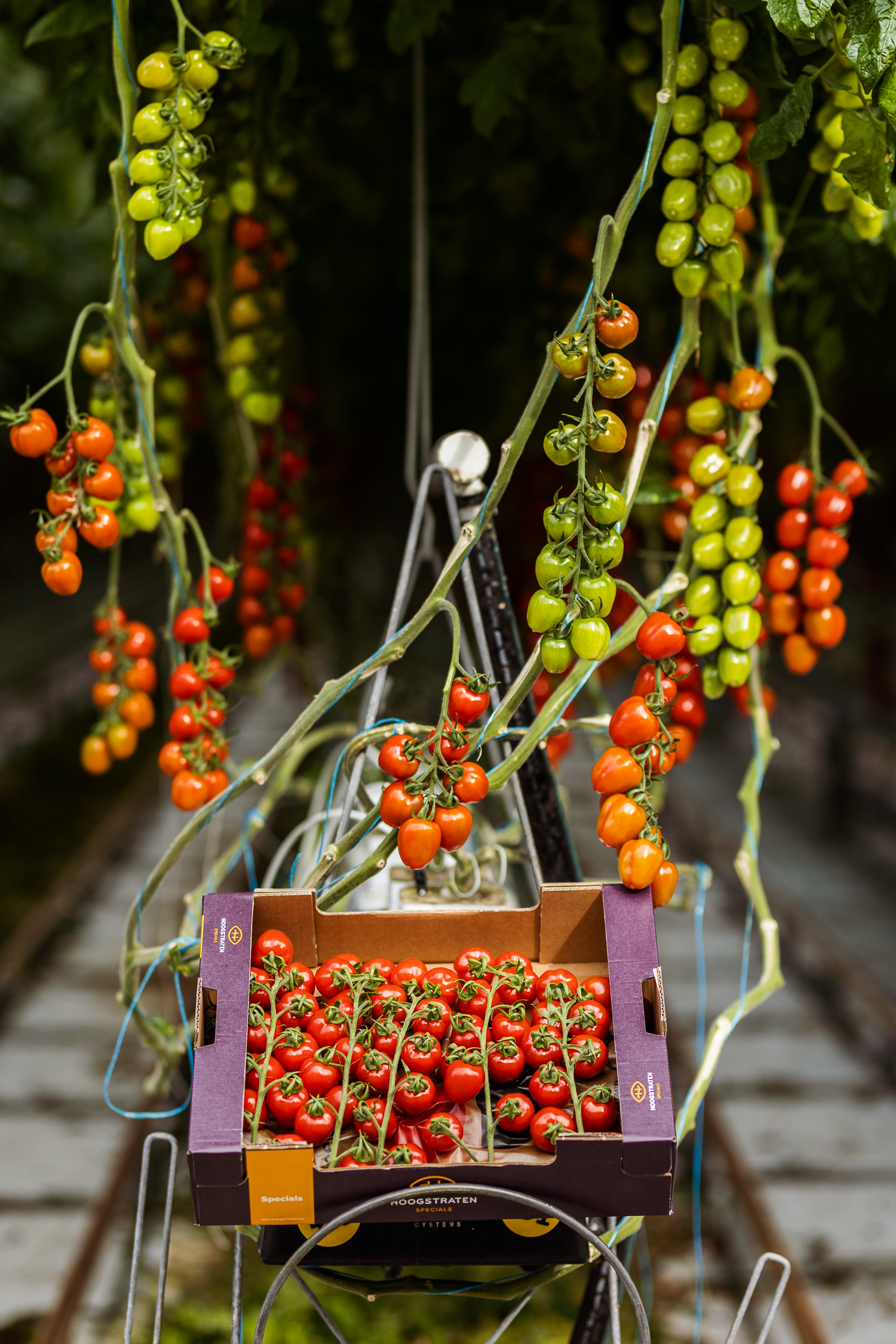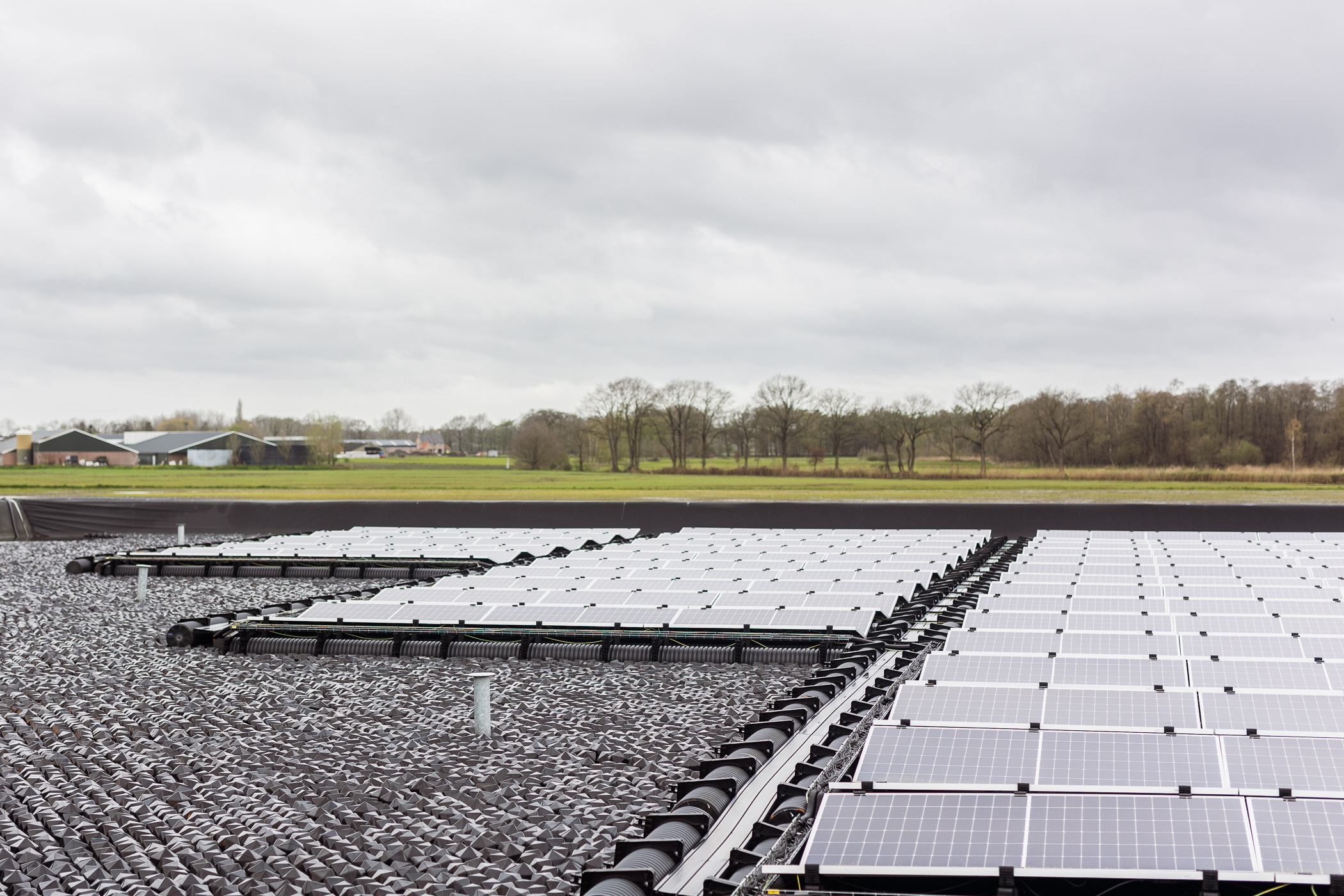Sustainability in tomato production - a practical example
Mitch Vermeiren is one of the managing directors of Meer Fresh Products. The company is part of Tomeco, a group of six Belgian tomato producers with generations of experience, each operating their own family business. The producers share the same values and combine their strengths to produce authentic 'Feel Good' tomatoes of the highest quality in a sustainable manner. The marketing of Tomeco products is handled by Coöperatie Hoogstraten.

Mitch Vermeiren from Hoogstraten, Belgium, is part of the management team of Meer Fresh Products.
Photo: ©VLAM
A wide range of quality tomatoes
Vermeiren practically grew up among tomatoes. His passion for innovation and sustainable entrepreneurship fuels him every day. "Traditionally, our focus was on plum tomatoes. Over the years, our portfolio has expanded to include various varieties, such as the San Marzano – available under the Thomasso brand – as well as Coeur de Boeuf and various vine tomato varieties, which we produce at the customer's request. For several years now, we’ve also been growing the strawberry-shaped, sweet cocktail tomato 'Frieda' (formerly 'Sweetest Queen'). Our greenhouse area, spread across several locations, covers a total of 80 hectares. The greenhouses are equipped with state-of-the-art technology," says the managing director.
Sustainable innovation as the key to success
Times are changing quickly, and developments are unstoppable. Vermeiren knows this all too well. "In the mid-1990s, we decided to focus on plum tomatoes. This brought strong growth to our company. Since 2015, we’ve also been producing tomatoes under artificial lighting, allowing us to reliably serve our customers year-round. For sustainability reasons, we’ve made significant investments in switching to LED lighting over the past few years. The lamps stand out with a five-times longer lifespan and better efficiency. This results in a 30% energy savings per kilogram of tomatoes. Additionally, the LED lighting is modular, so it can be tailored to the specific light requirements of the tomato plants."
The combination of authenticity and sustainable innovation is the key to success. "As producers, we have one goal in mind: to offer consumers healthy, fresh, and aromatic tomatoes while preserving tradition in a modern, economic environment. Reducing our ecological footprint is a top priority. Whether it's precision fertilization, efficient energy and water use, cultivation innovations, or integrated pest management, Tomeco guarantees sustainability at every stage of tomato production. Only by producing our tomatoes in a sustainable and authentic environment we can offer our customers ‘Feel Good’ tomatoes. To achieve this mission, we also invest a lot in our employees. After all, satisfied employees contribute to the quality of our products," Vermeiren is convinced.

Healthy, fresh, aromatic tomatoes are the trademark of Meer Fresh Products
Photo: ©VLAM
Efficient use of energy and water
Energy is an important aspect of operations in every respect. "Today, combined heat and power (CHP) is used as the main energy source in our company. This technology allows us to meet the heat and CO2 needs required for the growth process of our tomato plants in the most energy-efficient way possible. Through energy-sharing, LED growth lights, e-boilers, solar panels on the rainwater collection tank, biomass combustion, and deep geothermal energy, we are well-positioned to optimize and make our energy use more sustainable. Thanks to our 100% closed-loop irrigation system, our impact on water resources is also very low," says Vermeiren.
Floating solar panel system improves water quality
In terms of rainwater storage, the Tomeco group is completely self-sufficient. Around the greenhouses of Meer Fresh Products, five collection basins with a storage capacity of 59,000 m³ have been created. In addition, a floating ClickFloats solar park with more than 2,000 solar panels was installed on the rainwater basin a few years ago. Vermeiren explains: "Solar panels on water basins are more productive because they are cooled by the water; on roofs, however, the yield significantly decreases due to the heat. Additionally, the floating solar panels prevent water evaporation and algae formation. The system is therefore extremely beneficial."

Floating solar panels improve water quality
Photo: ©VLAM
Win-win solutions with neighboring companies
The Tomeco group is constantly looking for solutions to collaborate with neighboring companies to exchange heat, water, and electricity, thus reducing waste. Vermeiren explains: "A few years ago, we at Meer Fresh Products started discussions with the meat processing company Comeco, which takes part of the green energy from the floating solar panels. Specifically, it amounts to 1,400 megawatt-hours per year, which is equivalent to the annual consumption of 400 households. The condensate from our power plant and the overflow of rainwater in our basins is also intended for the meat processor. The cleaned water from Comeco’s production process then flows back to our greenhouses, where it is used for plant irrigation. The goal is to firmly establish this form of cooperation at our other production sites as well. It would be very welcome if this model, which offers numerous economic and climatic synergies, could be realized in other industries as well."
Data-driven cultivation for optimal growth
The greenhouses of Meer Fresh Products are equipped with all kinds of sensors to monitor factors such as climate, humidity, water supply, nutrients, and plant health. The data is collected, transferred to computers, and displayed in charts and tables. This allows constant monitoring of the plants. Vermeiren believes that data-driven production will become the standard in the future. The benefits of data usage are clear to him: "With data, we can closely monitor, minimize, and even prevent disease pressure. By making continuous adjustments based on the data, we can create optimal growth conditions. The more efficiently the plants grow, the healthier they will be in the end. In the past, producers had to keep an eye on the balance of light and moisture or the growth and stress phases of the plants themselves. It’s clear that technology is extremely welcome for monitoring on a cultivation area of 80 hectares. In addition, we also use the data for cultivation and work planning, harvest forecasts, etc. Besides the green thumb, expertise continues to play a key role in the production process, but with intelligent data management, everything runs much more efficiently, sustainably, and resiliently. And this trend will only intensify in the future," concludes Vermeiren.
.Fachkompetenz%20spielt%20eine%20Schl%C3%BCsselrolle.jpg)
Despite modern technology, expertise still plays a key role
Photo: ©VLAM